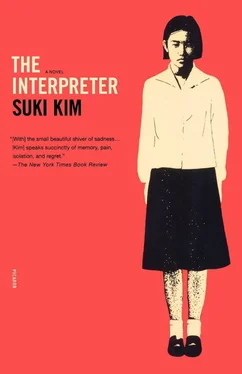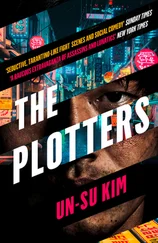The path cuts into the main road, where the sign reads “Montauk Highway.” Definitely not the smartest thing to walk along the highway, not in this rain, not alone, not dreaming of tears. But Suzy is determined; so is the person ahead. Hardly any cars pass. The road may continue this way, and Suzy will have circled the edge of New York, down to its rocky bottom.
Then, suddenly, without warning, emerges the lighthouse, up there in the distance, beaming into the brooding sky. The white.tower is forlorn and majestic, fenced in from all sides. Its silence seems so repressive that for a second Suzy is afraid for her parents, who lie beneath the cliff. Even in this rain, the flag hangs from the pole on its left. The gray colonial house has been turned into a museum with a gold plaque at its entrance which reads “Montauk Historical Society.” She soon finds the spot where Grace stood five years ago, holding on to the urn before finally opening its lid. Nothing there now except a lone bench behind a rusty viewfinder.
Tell me what happened, Mom, Dad, what really happened to you?
One thing Suzy has learned in the last five years is that nothing follows death, no revelation comes into play. Death is silent, heartless, heart-wrenchingly unfair. Each time Suzy comes here, sometimes twice, three times a year, she realizes how stock-still everything is, how immutable the lighthouse, how infinite the Montauk sky, how constant the rain, how absolutely unforgiving the water appears from where she stands. Each time Suzy stands here, she cringes at the way the watchtower looms over everything, as if it suggested man’s ultimate power over nature, and the star-spangled banner at the edge of the eastern coast, as if this very cliff were the helm of the American dream. And each time, she becomes certain that time has played tricks on her, and those five years—during which Suzy floated from job to job, from one married man to another—happened only so that she might stand and wait for someone, anyone, to step in and say, Look what you’ve done, look what you’ve been left with, look what you are, is this what you wanted?
What do you want after all, do you want me to tell you? Damian had pleaded in his final message.
But she is not alone. Someone else is here, over in the distance by the drenched flag, now facing her direction. It is hard to see the face buried beneath the hooded raincoat under the black umbrella, and so much rain between them. It is a man, she can tell that much. She takes a step toward him. An Asian man. Something about him strikes her as being familiar, the way he stands with his head tilted slightly to his right. She takes another hesitant step. She wants to shout something, say hello, excuse me, anything, but she seems to be choking and no words will come out. He stands there watching her, or perhaps watching beyond, toward the ocean. She follows his gaze and finds the angry sea gaping at her and wonders if it is a signal from her parents, a sign, a code she cannot understand. The sky is burning gray, almost red at its edges. Suddenly frightfully cold, Suzy tightens the opening of her coat. This overly chic trench coat—Michael had brought it from his last trip to London. Michael, whom she never thinks about when he is not around, which he never is. Odd that she should recall him now, so inappropriate, almost irreverent to her parents, who would weep for their daughter, who, after all these years, is hiding with another man who will never be hers. My dear Suzy, my girl, my poor daughter, where have we gone wrong, where did we go wrong with you? Mom might plead, which cannot be true, since she would never say anything so self-deprecating, would play dumb instead, avoid Suzy’s eyes, turn to Dad, who would take one final look at Suzy with a disgust, an anger that should never be directed by a father toward his daughter, words that should be swallowed instead, erased, so Suzy will not stand here five years later, five long, grueling years that brand her with the echo —Whore, you whore to a white man, a white married man, don’t ever come back.
But death is silent. Suzy shuts her eyes to the lashing waves. She still cannot cry, nothing will make her cry. Then, turning back, she notices that the man in the distance is no longer there.
The train back to Penn Station departs at 5 p.m. No time for a drink at McSwiggin’s. Twice in one day, Bob might become too familiar with her face, Grace’s face, whichever he takes her to be. The taxi pulls up exactly at four-thirty. The driver, with a bright-yellow T-shirt that says “Montauk Taxi,” looks no more than sixteen, and she wonders if the kid even has the proper license to be driving a commercial vehicle. He speeds on Montauk Highway along Napeague Bay, passing the dock with its fishing boats and a few bars with rooms upstairs where the fishermen blow the last of their sea-winded dollars. It takes less than ten minutes to get to the train station, and Suzy hands the driver the fourteen dollars before turning around and trying, for the hell of it, “Hey, happen to know who Kelly is?” The kid gingerly counts the dollar bills before replying in the thickest Irish lilt, “Sure, everyone knows Kelly, he rents boats out over at the dock, tiny sloops, two-person max. Why, you need a boat?”
THIRST IS WHAT GETS HER. The clock points to 4 a.m., which is inevitably the hour when she is awoken, breathless. She lingers in bed for a while before dragging herself to the refrigerator. The water is cool, a clean break from sleep. She fell asleep with the light on again. It is hard to believe that she slept at all under such brightness. There was no dream. The night was a black, soundless tunnel. Nothing interrupted her, no crying girl by the shore, no unknown hand shaking her home.
It is a terrible habit, to wake up in the middle of the night and reach for a cigarette. But the world is claustrophobic at 4 a.m., nothing comes to the rescue. The irises on the table still look serenely white, even if there’s a hint of wither, the writhing of petals. Averting her eyes, she notices the blinking red light on the answering machine. Several messages. Must be Michael. Suzy wonders why he calls her constantly, if he calls his wife also. The conversation is most often one-sided. He runs through everything he has accomplished that day, most of which Suzy does not really understand. He needs to report to someone, to anyone, to any ear that will listen. He talks about the conference calls with Germany, the merger meeting that busted, the additional clauses in the newest contract. Each feverish rant ends with the inevitable chuckle, “All it means, babe, is that they’re suckers and I’ve got you for love.” She wonders if he is lonely, if he ever thinks about being lonely.
The first time she slept with Michael, he got up at five in the morning to catch his train home. His wife and their five-month-old son lived in Westport, Connecticut. He had not seen them in two weeks, and Suzy could tell that he missed them. When he turned on the light to dress, Suzy pretended to be asleep. It was easier that way, and she preferred waking alone in the hotel room. She enjoyed lounging in the strange surroundings, which would become no longer strange, since Michael had a habit of always returning to the same room, 755 at the Waldorf-Astoria. The checkout was at twelve, and Suzy would take a long bath in the marble tub, whose enormous size seemed right out of a fairy tale. Afterward, she would wrap her body in the luscious terry-cloth robe and wait for the room service that Michael had ordered for her before leaving—the poached eggs with hollandaise sauce, a basket of freshly baked scones and croissants, and a tall glass of fresh carrot juice. The ritual seemed to be a good one; it had nothing to do with what she knew.
Читать дальше












